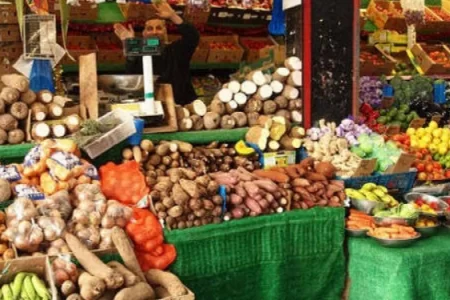African leaders and experts have begun hosting solutions-oriented meetings to address gaping holes in agricultural produce import and export agriculture regulations, with prohibitive intra-Africa trade tariffs for trading in basic agricultural products an easy first target.
“The largest and the highest tariffs that we impose against one another as Africans is on agricultural products. And yet, we are importing over US $100 billion worth of food from other parts of the world,” Wamkele, African Continental Free Trade Area Secretariat Secretary General, told the Africa Food Systems Summit 2024, held in Kigali in early September.
Areas experiencing food insecurity abound on the continent, due to both natural and human-caused disasters.
In September, Namibia began a controversial plan to cull 723 wild animals to reduce grazing pressures, increase water availability, and provide food to its drought-hit people .
Sudan, an economy that heavily depends on agriculture, is in a catastrophic situation due to armed conflict that has damaged infrastructure and disrupted agricultural services and industries.
A recent report – the IGAD Regional Focus of the 2024 Global Report on Food Crises – found that about 62.9 million people in Kenya, South Sudan, Sudan, Djibouti, Ethiopia, Somalia, and Uganda were grappling with high levels of acute food insecurity.
As a net food importer, Africa suffers from flactuations both in global food prices and in currencies, despite having over 65 per cent of the world’s uncultivated land and world’s youngest population.
According to African Development Bank (AfDB) some 15 African countries imported over 50% of their wheat products from either the Russia or Ukraine in 2020. Of those, six countries – Eritrea, Egypt, Benin, Sudan, Djibouti, and Tanzania – imported over 70% of their wheat from the northern region.
The result is that African countries spend over US$75 billion to import more than 100 million metric tons of cereals every year.
But there is hope.
Reducing and eliminating barriers to trade, Mene said, would bolster access to new markets especially across African country borders.
The AfCTFA secretariat secretary-general argued that while geopolitical conditions around the world have contributed to an unprecedented food insecurity crisis in Africa, the continent must take advantage by tapping into African countries that can potentially supply the continent. That includes countries like Zimbabwe and Ethiopia.
“We know that there are countries in Africa that have the capability to provide food security in Africa,” Mene explained.
Equity Bank Chief Executive Officer, Dr. James Mwangi said it is time to build the capacity of local small scale farmers and create policies that shift agriculture from being a social sector to a commercial sector.
“If you look at Ukraine, it can feed the entire Africa on its own, yet it’s just 60% of the land mass of Tanzania. So it’s not lack of labor, it’s lack of coherent policies and not investing in the capability of the farmer to have the capacity to compete in a global marketplace from a productivity perspective,” said Mwangi.
Mwangi argued that unlike Ukraine which attracts global capital investment, Africa’s productivity is just an eighth of world productivity, offering no returns on investment, making it less attractive to foreign and local investors.
“Capital finance looks for a return. Agriculture is not giving a market return. So let’s address productivity through policy, let’s create a market that will solve the problem of finance,” he said.
Mwangi disclosed that of Equity Bank’s US$14 billion in resources, ‘60% is in liquid form because it’s lacking opportunities that give it a return.’
Equity Bank is headquartered in Kenya, with subsidiaries in Kenya, Uganda, Tanzania, South Sudan, Rwanda, Democratic Republic of the Congo and a representative office in Ethiopia.
In a new report, AGRA, an African-led organization with a presence in 11 countries that seeks to catalyse Agriculture Transformation, said food systems require a multi-faceted approach.
Titled “Harnessing the Private Sector for Food Systems Transformation in Africa,” the Africa Agriculture Status Report 2024 built a case demonstrating how investments in cash crops, infrastructure and digital technologies are driving diversification and boosting export growth in a number of countries.
“By harnessing the power of the private sector, we can drive meaningful food systems transformation and achieve sustainable growth,” said AGRA’s President, Agnes Kalibata.
Case studies include how Malawi’s substantial investments in groundnut production, supported by new seed varieties and enhanced processing capabilities, is not only bolstering local agriculture but also expanding the country’s export markets.
In Nigeria strategic investments in modern farming techniques and processing infrastructure have revitalized its cocoa sector while in Ghana, mobile platforms like AgroCenta have revolutionized agriculture by providing farmers with crucial market information, access to credit, and improved input distribution.
In Kenya, production of macadamia nuts alongside the adoption of digital platforms for farm management and market access, has positioned the country as a leading exporter despite regulatory and market challenges.
According to the AGRA report, the private sector drives approximately 80% of Africa’s food economy, with MSMEs playing a dominant role in managing around 85% of the agrifood value chains.
Institutions sitting on cash, like Equity Bank, are looking for opportunities to invest in agriculture. A change in intra-African trade tariffs is what leaders are now looking to, to ensure that Africa feeds itself, no matter what localised emergencies may develop.
Source:norvanreports.com

